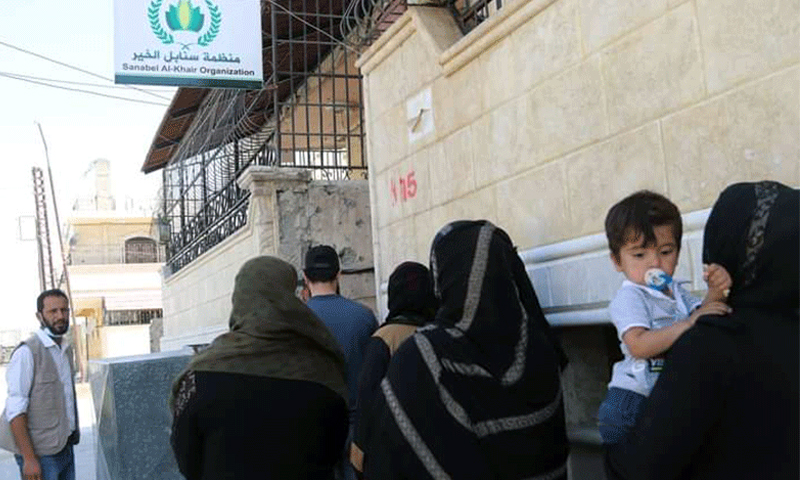



Raqqa – Hussam al-Omar
Louay al-Qassem, 30 years old, reluctantly agreed to split first three months salaries from the relief organization he works for in Raqqa with the person who helped him find the job.
Al-Qassem told Enab Baladi that he was paid 300 USD for three months. He had to pay half of his salary, 600 USD, to that person related to the organization in exchange for a six-month employment contract as a director of the human resources department.
Al-Qassem points out that finding a job in an NGO is like a dream for all young people of Raqqa due to attractive salaries and benefits, compared with those provided by the Autonomous Administration-linked institutions or the free labor markets.
Just like al-Qassem, several employees or applicants for jobs in NGOs are blackmailed in many ways by the NGOs’ officers, office directors, or persons associated with them.
The NGOs, operating in Raqqa, work primarily to provide relief assistance to some neighborhoods of the city or establish social and cultural activities.
Locals also complained that NGOs in Raqqa mistreat applicants for jobs by requiring part of their salaries as a bribe to hire them. Furthermore, some NGOs exploit volunteers.
Fadela Hussein, 30 years old, applied for a volunteer position in a community-based organization in Raqqa. She said that she had been promised a chance for paid work if the organization received sufficient funding from donors.
Fadela told Enab Baladi that she was “shocked”—after her volunteer job ended, which focused on distributing leaflets and instructing residents to follow the guidelines for the prevention of the novel coronavirus, that the organization hired numerous people, “most of whom” were not among the former volunteers.
Fadela went to the organization’s office to complain about the recruitment decisions. However, her complaints were met with only “ridicule and mockery.”
The director of the organization asked her to leave and “forget the address of the organization.”
Enab Baladi contacted a member of the Social Affairs and Labor Committee (SALC) of Raqqa’s Civil Council, which is the institution concerned with regulating the work of organizations in Raqqa.
The committee member said that the way in which the NGOs operate and their recruitment process are considered “internal affairs,” and the SALC cannot interfere with them.
The committee member, who declined to be named because he does not have permission to speak to the media, added that the terms of the contract between the SALC and NGOs serve as “labor constitution.” The SALC can stop the NGOs from working in the case of the failure to comply with the above-mentioned “constitution.”
NGOs are often accused of fraud, corruption, and mismanagement of donor funds, and the situation in Raqqa is no different.
Sabri al-Ali, a former accountant in one of the organizations concerned with supporting small projects in Raqqa, said that he was forced to leave the organization he used to work for because there was a “massive” manipulation in the invoices of the projects that it was organizing and implementing.
Al-Sabri ِadded that he repeatedly fought with his manager because the latter asked him to falsify invoices and set prices for devices and tools provided for projects at values that did not match their real market price.
The accountant believes that those in charge of organizations “blackmail” their employees by offering tempting salaries in exchange for concealing or participating in corruption.
The terms of the contract in the NGOs include the organization’s work plan, the nature of its work, and the neighborhoods it targets in the event of aid distribution, with an explanation of the external support bodies.
The organizational structure of the Raqqa Civil Council lacks a supervisory body that monitors the affairs of NGOs and scrutinizes their projects, except for the contract signed between the council and an NGO, the SALC member said.
Local pages in Raqqa, via social media platforms, constantly report complaints from the city’s residents about the corruption of NGOs, the duplication of their work, and the delay in distributing relief subsidies to poor families.
More than 110 NGOs in Raqqa are officially registered with the Organizations Office of the Raqqa Civil Council, which is responsible for granting work permits and coordination.
According to the UN Office for the Coordination of Humanitarian Affairs (OCHA), there are 33 civil organizations in Raqqa, which the Autonomous Administration controls, five of which are affiliated with the UN, 21 are non-governmental organizations. Two are affiliated with the government of the Syrian regime.
if you think the article contain wrong information or you have additional details Send Correction